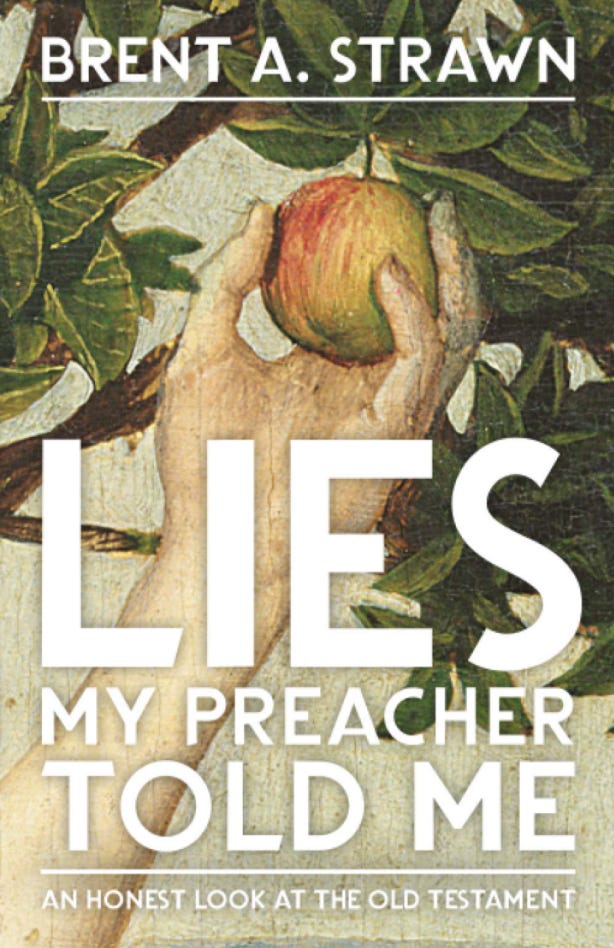The Old Testament undoubtedly has scenes of violence. Some of them are hands-over-the-eyes brutal. Honest Bible readers know the New Testament has a few as well, if not more.
Brent Strawn, in his book Lies My Preacher Told Me, probes the problem of violence in the Old Testament (and the New Testament). The either-or approach will not work.
When God created the world it was at peace and when creation is new creation and all injustices resolved, peace will rule again. These are, in his terms, the bookends of peace. I like that expression. In between is the problem. Humans are violent, there is not a nation in the ancient world not riven with violence. Humans are violent. It is impossible to tell the story of Egypt or Assyria or Greece or Persia or Rome or Israel without telling stories about wars and violence and bloodshed.
We are violent too, and we as Christians participate in violence. So Strawn puts on the table a rather long finger-pointer and says in effect “Take a look at yourself.” We have violent games we play for fun on our devices; TV shows and movies are incredibly violent (Marvel anyone?); even music is terribly violent at times. Are we the ones then to sit in judgment on ancient cultures and violence? It’s a fair question.
But God’s involved in the OT, right? Yes, that’s right. That’s a problem. God spoke in those days in their ways.
What about the New Testament? Read this:
2Th. 1:5This is evidence of the righteous judgment of God, and is intended to make you worthy of the kingdom of God, for which you are also suffering. 6 For it is indeed just of God to repay with affliction those who afflict you, 7 and to give relief to the afflicted as well as to us, when the Lord Jesus is revealed from heaven with his mighty angels 8 in flaming fire, inflicting vengeance on those who do not know God and on those who do not obey the gospel of our Lord Jesus. 9 These will suffer the punishment of eternal destruction, separated from the presence of the Lord and from the glory of his might, 10 when he comes to be glorified by his saints and to be marveled at on that day among all who have believed, because our testimony to you was believed. 11 To this end we always pray for you, asking that our God will make you worthy of his call and will fulfill by his power every good resolve and work of faith, 12 so that the name of our Lord Jesus may be glorified in you, and you in him, according to the grace of our God and the Lord Jesus Christ.
Pretty serious stuff.
Revelation attributes similar “violent” battle to the work of the Lamb and to the God on the Throne. Jesus warned in Mark 13 of impending judgment on Jerusalem at the hand of Rome as divine judgment and discipline.
Maybe we need to stop – Yes, we must stop – thinking of this in strictly OT vs. NT terms.
Is there a way out?
Not really. But there are some things to think about and I wonder what your comments are.
First, acknowledge the powerful scenes in the Bible.
Second, remember the bookends of peace and that war and violence are not God’s ultimate designs.
Third, and this one is important to Strawn and to me: the battles are exaggerated and at times probably so hyperbolic they are more like fiction than history. The battles are designed to depict divine judgment against evil, sinfulness, idolatries and the economic exploitations of unjust empires. Evil must be erased; sin must go away; destruction is the hope of the oppressed; the oppressed want justice and you can’t have justice until injustices are done away with.
Fourth, the texts about violence are more descriptive than prescriptive. In them we see what happened and not how we are to live.
Fifth, we are to live in peace and embody an alternative way of life and the Bible shows the way of violence and the way of peace.
In my view, these texts are in our Bible because our world is filled too often with injustice. We are to live “as if” the bookend of peace is coming.





Thank you for this synopsis. I wish I could afford to get all the interesting books all the time, but I can't, so this is extremely helpful. You've given me a way to approach this issue because I've heard this objection about the "God of the Old Testament" as a violent, vengeful God.
"The battles are exaggerated and at times probably so hyperbolic they are more like fiction than history." I thought that comment was helpful---helps me deal with Jericho. If you were still at TEDS, Scot, would they give you the boot for that? We just arrived home for Texas, driving today from Arkansas to Grand Rapids, John riding shotgun the entire way, as he normally does. He reads to me while we drive, this morning the first chapters of Job. I delivered 5 days of lectures on that book several years ago at InterVarsity's Cedar Campus in the UP of Michigan. I taught it as a parable, as I believe it is, but it caused a bit of controversy. Are you ever going to write a book or some posts on the Book of Job, Scot. If you do, I'll comment on why I believe it's the grandest parable of the Bible. BTW, John reads aloud only from the KJV. It would make old David Otis Fuller proud (were he still alive)!